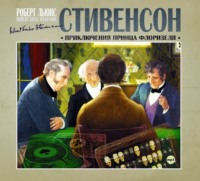 полная версия
полная версияThe Works of Robert Louis Stevenson – Swanston Edition. Volume 7
The power of this man over the Princess is, therefore, without bounds. She has sacrificed to the adoration with which he has inspired her not only her marriage vow and every shred of public decency, but that vice of jealousy which is so much dearer to the female sex than either intrinsic honour or outward consideration. Nay, more: a young, although not a very attractive woman, and a princess both by birth and fact, she submits to the triumphant rivalry of one who might be her mother as to years, and who is so manifestly her inferior in station. This is one of the mysteries of the human heart. But the rage of illicit love, when it is once indulged, appears to grow by feeding; and to a person of the character and temperament of this unfortunate young lady, almost any depth of degradation is within the reach of possibility.
CHAPTER III
THE PRINCE AND THE ENGLISH TRAVELLER
So far Otto read, with waxing indignation; and here his fury overflowed. He tossed the roll upon the table and stood up. “This man,” he said, “is a devil. A filthy imagination, an ear greedy of evil, a ponderous malignity of thought and language: I grow like him by the reading! Chancellor, where is this fellow lodged?”
“He was committed to the Flag Tower,” replied Greisengesang, “in the Gamiani apartment.”
“Lead me to him,” said the Prince; and then, a thought striking him, “Was it for that,” he asked, “that I found so many sentries in the garden?”
“Your Highness, I am unaware,” answered Greisengesang, true to his policy. “The disposition of the guards is a matter distinct from my functions.”
Otto turned upon the old man fiercely, but ere he had time to speak, Gotthold touched him on the arm. He swallowed his wrath with a great effort. “It is well,” he said, taking the roll. “Follow me to the Flag Tower.”
The Chancellor gathered himself together, and the two set forward. It was a long and complicated voyage; for the library was in the wing of the new buildings, and the tower which carried the flag was in the old schloss upon the garden. By a great variety of stairs and corridors, they came out at last upon a patch of gravelled court; the garden peeped through a high grating with a flash of green; tall, old, gabled buildings mounted on every side; the Flag Tower climbed, stage after stage, into the blue; and high over all, among the building daws, the yellow flag wavered in the wind. A sentinel at the foot of the tower stairs presented arms; another paced the first landing; and a third was stationed before the door of the extemporised prison.
“We guard this mud-bag like a jewel,” Otto sneered.
The Gamiani apartment was so called from an Italian doctor who had imposed on the credulity of a former prince. The rooms were large, airy, pleasant, and looked upon the garden; but the walls were of great thickness (for the tower was old), and the windows were heavily barred. The Prince, followed by the Chancellor, still trotting to keep up with him, brushed swiftly through the little library and the long saloon, and burst like a thunderbolt into the bedroom at the farther end. Sir John was finishing his toilet; a man of fifty, hard, uncompromising, able, with the eye and teeth of physical courage. He was unmoved by the irruption, and bowed with a sort of sneering ease.
“To what am I to attribute the honour of this visit?” he asked.
“You have eaten my bread,” replied Otto, “you have taken my hand, you have been received under my roof. When did I fail you in courtesy? What have you asked that was not granted as to an honoured guest? And here, sir,” tapping fiercely on the manuscript, “here is your return.”
“Your Highness has read my papers?” said the Baronet. “I am honoured indeed. But the sketch is most imperfect. I shall now have much to add. I can say that the Prince, whom I had accused of idleness, is zealous in the department of police, taking upon himself those duties that are most distasteful. I shall be able to relate the burlesque incident of my arrest, and the singular interview with which you honour me at present. For the rest, I have already communicated with my Ambassador at Vienna; and unless you propose to murder me, I shall be at liberty, whether you please or not, within the week. For I hardly fancy the future empire of Grünewald is yet ripe to go to war with England. I conceive I am a little more than quits. I owe you no explanation; yours has been the wrong. You, if you have studied my writing with intelligence, owe me a large debt of gratitude. And to conclude, as I have not yet finished my toilet, I imagine the courtesy of a turnkey to a prisoner would induce you to withdraw.”
There was some paper on the table, and Otto, sitting down, wrote a passport in the name of Sir John Crabtree.
“Affix the seal, Herr Cancellarius,” he said, in his most princely manner, as he rose.
Greisengesang produced a red portfolio, and affixed the seal in the unpoetic guise of an adhesive stamp; nor did his perturbed and clumsy movements at all lessen the comedy of the performance. Sir John looked on with a malign enjoyment; and Otto chafed, regretting, when too late, the unnecessary royalty of his command and gesture. But at length the Chancellor had finished his piece of prestidigitation, and, without waiting for an order, had countersigned the passport. Thus regularised, he returned it to Otto with a bow.
“You will now,” said the Prince, “order one of my own carriages to be prepared; see it, with your own eyes, charged with Sir John’s effects, and have it waiting within the hour behind the Pheasant House. Sir John departs this morning for Vienna.”
The Chancellor took his elaborate departure.
“Here, sir, is your passport,” said Otto, turning to the Baronet. “I regret it from my heart that you have met inhospitable usage.”
“Well, there will be no English war,” returned Sir John.
“Nay, sir,” said Otto; “you surely owe me your civility. Matters are now changed, and we stand again upon the footing of two gentlemen. It was not I who ordered your arrest; I returned late last night from hunting; and as you cannot blame me for your imprisonment, you may even thank me for your freedom.”
“And yet you read my papers,” said the traveller shrewdly.
“There, sir, I was wrong,” returned Otto; “and for that I ask your pardon. You can scarce refuse it, for your own dignity, to one who is a plexus of weaknesses. Nor was the fault entirely mine. Had the papers been innocent, it would have been at most an indiscretion. Your own guilt is the sting of my offence.”
Sir John regarded Otto with an approving twinkle; then he bowed, but still in silence.
“Well, sir, as you are now at your entire disposal, I have a favour to beg of your indulgence,” continued the Prince. “I have to request that you will walk with me alone into the garden so soon as your convenience permits.”
“From the moment that I am a free man,” Sir John replied, this time with perfect courtesy, “I am wholly at your Highness’s command; and if you will excuse a rather summary toilet, I will even follow you as I am.”
“I thank you, sir,” said Otto.
So without more delay, the Prince leading, the pair proceeded down through the echoing stairway of the tower, and out through the grating, into the ample air and sunshine of the morning, and among the terraces and flower-beds of the garden. They crossed the fish-pond, where the carp were leaping as thick as bees; they mounted, one after another, the various flights of stairs, snowed upon, as they went, with April blossoms, and marching in time to the great orchestra of birds. Nor did Otto pause till they had reached the highest terrace of the garden. Here was a gate into the park, and hard by, under a tuft of laurel, a marble garden seat. Hence they looked down on the green tops of many elm-trees, where the rooks were busy; and, beyond that, upon the palace roof, and the yellow banner flying in the blue. “I pray you to be seated, sir,” said Otto.
Sir John complied without a word; and for some seconds Otto walked to and fro before him, plunged in angry thought. The birds were all singing for a wager.
“Sir,” said the Prince at length, turning towards the Englishman, “you are to me, except by the conventions of society, a perfect stranger. Of your character and wishes I am ignorant. I have never wittingly disobliged you. There is a difference in station, which I desire to waive. I would, if you still think me entitled to so much consideration – I would be regarded simply as a gentleman. Now, sir, I did wrong to glance at these papers, which I here return to you; but if curiosity be undignified, as I am free to own, falsehood is both cowardly and cruel. I opened your roll; and what did I find – what did I find about my wife? Lies!” he broke out. “They are lies! There are not, so help me God! four words of truth in your intolerable libel! You are a man; you are old, and might be the girl’s father; you are a gentleman; you are a scholar, and have learned refinement; and you rake together all this vulgar scandal, and propose to print it in a public book! Such is your chivalry! But, thank God, sir, she has still a husband. You say, sir, in that paper in your hand, that I am a bad fencer; I have to request from you a lesson in the art. The park is close behind; yonder is the Pheasant House, where you will find your carriage; should I fall, you know, sir – you have written it in your paper – how little my movements are regarded; I am in the custom of disappearing: it will be one more disappearance; and long before it has awakened a remark, you may be safe across the border.”
“You will observe,” said Sir John, “that what you ask is impossible.”
“And if I struck you?” cried the Prince, with a sudden menacing flash.
“It would be a cowardly blow,” returned the Baronet, unmoved, “for it would make no change. I cannot draw upon a reigning sovereign.”
“And it is this man, to whom you dare not offer satisfaction, that you choose to insult!” cried Otto.
“Pardon me,” said the traveller, “you are unjust. It is because you are a reigning sovereign that I cannot fight with you; and it is for the same reason that I have a right to criticise your action and your wife. You are in everything a public creature; you belong to the public, body and bone. You have with you the law, the muskets of the army, and the eyes of spies. We, on our side, have but one weapon – truth.”
“Truth!” echoed the Prince, with a gesture.
There was another silence.
“Your Highness,” said Sir John at last, “you must not expect grapes from a thistle. I am old and a cynic. Nobody cares a rush for me; and on the whole, after the present interview, I scarce know anybody that I like better than yourself. You see, I have changed my mind, and have the uncommon virtue to avow the change. I tear up this stuff before you, here in your own garden; I ask your pardon, I ask the pardon of the Princess; and I give you my word of honour as a gentleman and an old man, that when my book of travels shall appear it shall not contain so much as the name of Grünewald. And yet it was a racy chapter! But had your Highness only read about the other courts! I am a carrion crow; but it is not my fault, after all, that the world is such a nauseous kennel.”
“Sir,” said Otto, “is the eye not jaundiced?”
“Nay,” cried the traveller, “very likely. I am one who goes sniffing; I am no poet. I believe in a better future for the world; or, at all accounts, I do most potently disbelieve in the present. Rotten eggs is the burthen of my song. But indeed, your Highness, when I meet with any merit, I do not think that I am slow to recognise it. This is a day that I shall still recall with gratitude, for I have found a sovereign with some manly virtues; and for once – old courtier and old radical as I am – it is from the heart and quite sincerely that I can request the honour of kissing your Highness’s hand?”
“Nay, sir,” said Otto, “to my heart!”
And the Englishman, taken at unawares, was clasped for a moment in the Prince’s arms.
“And now, sir,” added Otto, “there is the Pheasant House; close behind it you will find my carriage, which I pray you to accept. God speed you to Vienna!”
“In the impetuosity of youth,” replied Sir John, “your Highness has overlooked one circumstance: I am still fasting.”
“Well, sir,” said Otto, smiling, “you are your own master; you may go or stay. But I warn you, your friend may prove less powerful than your enemies. The Prince, indeed, is thoroughly on your side; he has all the will to help; but to whom do I speak? – you know better than I do, he is not alone in Grünewald.”
“There is a deal in position,” returned the traveller, gravely nodding. “Gondremark loves to temporise; his policy is below ground, and he fears all open courses; and now that I have seen you act with so much spirit, I will cheerfully risk myself on your protection. Who knows? You may be yet the better man.”
“Do you indeed believe so?” cried the Prince. “You put life into my heart!”
“I will give up sketching portraits,” said the Baronet. “I am a blind owl; I had misread you strangely. And yet remember this: a sprint is one thing, and to run all day another. For I still mistrust your constitution; the short nose, the hair and eyes of several complexions; no, they are diagnostic; and I must end, I see, as I began.”
“I am still a singing chambermaid?” said Otto.
“Nay, your Highness, I pray you to forget what I had written,” said Sir John; “I am not like Pilate; and the chapter is no more. Bury it, if you love me.”
CHAPTER IV
WHILE THE PRINCE IS IN THE ANTE-ROOM…
Greatly comforted by the exploits of the morning, the Prince turned towards the Princess’s ante-room, bent on a more difficult enterprise. The curtains rose before him, the usher called his name, and he entered the room with an exaggeration of his usual mincing and airy dignity. There were about a score of persons waiting, principally ladies; it was one of the few societies in Grünewald where Otto knew himself to be popular; and while a maid of honour made her exit by a side door to announce his arrival to the Princess, he moved round the apartment, collecting homage and bestowing compliments with friendly grace. Had this been the sum of his duties, he had been an admirable monarch. Lady after lady was impartially honoured by his attention.
“Madam,” he said to one, “how does this happen? I find you daily more adorable.”
“And your Highness daily browner,” replied the lady. “We began equal; oh, there I will be bold: we have both beautiful complexions. But while I study mine, your Highness tans himself.”
“A perfect negro, madam; and what so fitly – being beauty’s slave?” said Otto. – “Madame Grafinski, when is our next play? I have just heard that I am a bad actor.”
“O ciel!” cried Madame Grafinski. “Who could venture? What a bear!”
“An excellent man, I can assure you,” returned Otto.
“O, never! O, is it possible!” fluted the lady. “Your Highness plays like an angel.”
“You must be right, madam; who could speak falsely and yet look so charming?” said the Prince. “But this gentleman, it seems, would have preferred me playing like an actor.”
A sort of hum, a falsetto, feminine cooing, greeted the tiny sally; and Otto expanded like a peacock. This warm atmosphere of women and flattery and idle chatter pleased him to the marrow.
“Madame von Eisenthal, your coiffure is delicious,” he remarked.
“Everyone was saying so,” said one.
“If I have pleased Prince Charming?” And Madame von Eisenthal swept him a deep curtsey with a killing glance of adoration.
“It is new?” he asked. “Vienna fashion.”
“Mint new,” replied the lady, “for your Highness’s return. I felt young this morning; it was a premonition. But why, Prince, do you ever leave us?”
“For the pleasure of the return,” said Otto. “I am like a dog; I must bury my bone, and then come back to gloat upon it.”
“O, a bone! Fie, what a comparison! You have brought back the manners of the wood,” returned the lady.
“Madam, it is what the dog has dearest,” said the Prince. “But I observe Madame von Rosen.”
And Otto, leaving the group to which he had been piping, stepped towards the embrasure of a window where a lady stood.
The Countess von Rosen had hitherto been silent, and a thought depressed, but on the approach of Otto she began to brighten. She was tall, slim as a nymph, and of a very airy carriage; and her face, which was already beautiful in repose, lightened and changed, flashed into smiles, and glowed with a lovely colour at the touch of animation. She was a good vocalist; and, even in speech, her voice commanded a great range of changes, the low notes rich with tenor quality, the upper ringing, on the brink of laughter, into music. A gem of many facets, and variable hues of fire; a woman who withheld the better portion of her beauty, and then, in a caressing second, flashed it like a weapon full on the beholder; now merely a tall figure and a sallow handsome face, with the evidences of a reckless temper; anon opening like a flower to life and colour, mirth and tenderness: – Madame von Rosen had always a dagger in reserve for the despatch of ill-assured admirers. She met Otto with the dart of tender gaiety.
“You have come to me at last, Prince Cruel,” she said. “Butterfly! Well, and am I not to kiss your hand?” she added.
“Madam, it is I who must kiss yours.” And Otto bowed and kissed it.
“You deny me every indulgence,” she said, smiling.
“And now what news in court?” inquired the Prince. “I come to you for my gazette.”
“Ditch-water!” she replied. “The world is all asleep, grown grey in slumber; I do not remember any waking movement since quite an eternity; and the last thing in the nature of a sensation was the last time my governess was allowed to box my ears. But yet I do myself and your unfortunate enchanted palace some injustice. Here is the last – O positively!” And she told him the story from behind her fan, with many glances, many cunning strokes of the narrator’s art. The others had drawn away, for it was understood that Madame von Rosen was in favour with the Prince. None the less, however, did the Countess lower her voice at times to within a semitone of whispering; and the pair leaned together over the narrative.
“Do you know,” said Otto, laughing, “you are the only entertaining woman on this earth!”
“O, you have found out so much,” she cried.
“Yes, madam, I grow wiser with advancing years,” he returned.
“Years!” she repeated. “Do you name the traitors? I do not believe in years; the calendar is a delusion.”
“You must be right, madam,” replied the Prince. “For six years that we have been good friends, I have observed you to grow younger.”
“Flatterer,” cried she, and then, with a change, “But why should I say so,” she added, “when I protest I think the same? A week ago I had a council with my father director, the glass; and the glass replied, ‘Not yet!’ I confess my face in this way once a month. O! a very solemn moment. Do you know what I shall do when the mirror answers, ‘Now’?”
“I cannot guess,” said he.
“No more can I,” returned the Countess. “There is such a choice! Suicide, gambling, a nunnery, a volume of memoirs, or politics – the last, I am afraid.”
“It is a dull trade,” said Otto.
“Nay,” she replied, “it is a trade I rather like. It is, after all, first cousin to gossip, which no one can deny to be amusing. For instance, if I were to tell you that the Princess and the Baron rode out together daily to inspect the cannon, it is either a piece of politics or scandal, as I turn my phrase. I am the alchemist that makes the transmutation. They have been everywhere together since you left,” she continued, brightening as she saw Otto darken; “that is a poor snippet of malicious gossip – and they were everywhere cheered – and with that addition all becomes political intelligence.”
“Let us change the subject,” said Otto.
“I was about to propose it,” she replied, “or rather to pursue the politics. Do you know? this war is popular – popular to the length of cheering Princess Seraphina.”
“All things, madam, are possible,” said the Prince; “and this among others, that we may be going into war, but I give you my word of honour I do not know with whom.”
“And you put up with it?” she cried. “I have no pretensions to morality; and I confess I have always abominated the lamb, and nourished a romantic feeling for the wolf. O, be done with lambiness! Let us see there is a prince, for I am weary of the distaff.”
“Madam,” said Otto, “I thought you were of that faction.”
“I should be of yours, mon Prince, if you had one,” she retorted. “Is it true that you have no ambition? There was a man once in England whom they call the kingmaker. Do you know,” she added, “I fancy I could make a prince?”
“Some day, madam,” said Otto, “I may ask you to help make a farmer.”
“Is that a riddle?” asked the Countess.
“It is,” replied the Prince, “and a very good one too.”
“Tit for tat. I will ask you another,” she returned. “Where is Gondremark?”
“The Prime Minister? In the prime-ministry, no doubt,” said Otto.
“Precisely,” said the Countess; and she pointed with her fan to the door of the Princess’s apartments. “You and I, mon Prince, are in the ante-room. You think me unkind,” she added. “Try me and you will see. Set me a task, put me a question; there is no enormity I am not capable of doing to oblige you, and no secret that I am not ready to betray.”
“Nay, madam, but I respect my friend too much,” he answered, kissing her hand. “I would rather remain ignorant of all. We fraternise like foemen soldiers at the outposts, but let each be true to his own army.”
“Ah,” she cried, “if all men were generous like you, it would be worth while to be a woman!” Yet, judging by her looks, his generosity, if anything, had disappointed her; she seemed to seek a remedy, and, having found it, brightened once more. “And now,” she said, “may I dismiss my sovereign? This is rebellion and a cas pendable; but what am I to do? My bear is jealous!”
“Madam, enough!” cried Otto. “Ahasuerus reaches you the sceptre; more, he will obey you in all points. I should have been a dog to come to whistling.”
And so the Prince departed, and fluttered round Grafinski and von Eisenthal. But the Countess knew the use of her offensive weapons, and had left a pleasant arrow in the Prince’s heart. That Gondremark was jealous – here was an agreeable revenge! And Madame von Rosen, as the occasion of the jealousy, appeared to him in a new light.
CHAPTER V
… GONDREMARK IS IN MY LADY’S CHAMBER
The Countess von Rosen spoke the truth. The great Prime Minister of Grünewald was already closeted with Seraphina. The toilet was over; and the Princess, tastefully arrayed, sat face to face with a tall mirror. Sir John’s description was unkindly true, true in terms and yet a libel, a misogynistic masterpiece. Her forehead was perhaps too high, but it became her; her figure somewhat stooped, but every detail was formed and finished like a gem; her hand, her foot, her ear, the set of her comely head, were all dainty and accordant; if she was not beautiful, she was vivid, changeful, coloured, and pretty with a thousand various prettinesses; and her eyes, if they indeed rolled too consciously, yet rolled to purpose. They were her most attractive feature, yet they continually bore eloquent false witness to her thoughts; for while she herself, in the depths of her immature, unsoftened heart, was given altogether to man-like ambition and the desire of power, the eyes were by turns bold, inviting, fiery, melting, and artful, like the eyes of a rapacious siren. And artful, in a sense, she was. Chafing that she was not a man, and could not shine by action, she had, conceived a woman’s part, of answerable domination; she sought to subjugate for by-ends, to rain influence and be fancy free; and, while she loved not man, loved to see man obey her. It is a common girl’s ambition. Such was perhaps that lady of the glove, who sent her lover to the lions. But the snare is laid alike for male and female, and the world most artfully contrived.
Near her, in a low chair, Gondremark had arranged his limbs into a cat-like attitude, high-shouldered, stooping, and submiss. The formidable blue jowl of the man, and the dull bilious eye, set perhaps a higher value on his evident desire to please. His face was marked by capacity, temper, and a kind of bold, piratical dishonesty which it would be calumnious to call deceit. His manners, as he smiled upon the Princess, were over-fine, yet hardly elegant.









